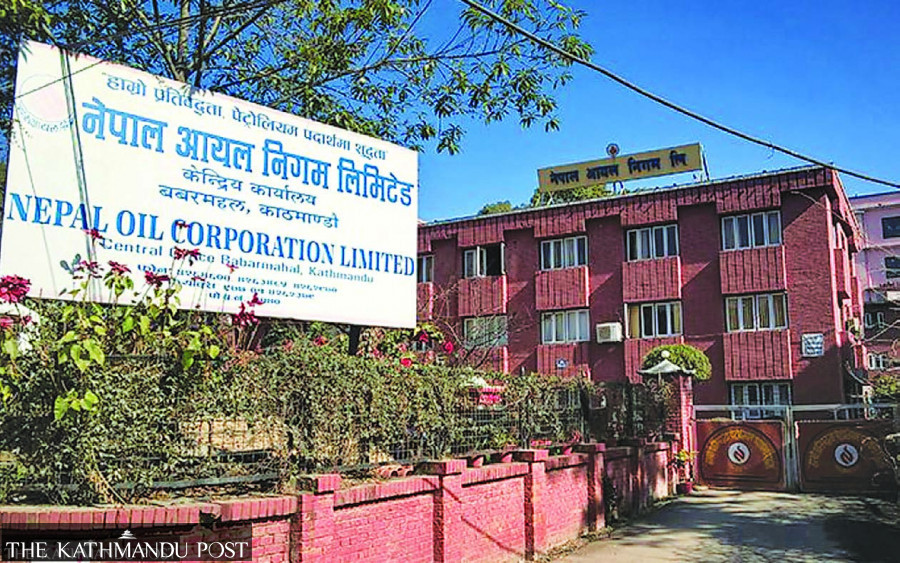National
Nepal Oil Corporation’s outstanding dues to its Indian supplier rise to Rs30 billion
There is, however, optimism that the financial situation of the national oil monopoly will improve after petroleum prices started to decline in the international market amid global recession fears.
Prithvi Man Shrestha
The outstanding dues of the Nepal Oil Corporation to its supplier, the Indian Oil Corporation, increased by Rs8 billion to Rs30 billion in the last two weeks, the state-owned oil monopoly said.
With the government failing to compensate for the shortfall after the oil monopoly slashed diesel and petrol prices in late June, it has not been able to make full payment to the Indian supplier for the last two weeks.
“We paid Rs5.1 billion to the IOC on Friday after paying an equivalent amount last week,” said Nagendra Sah, deputy managing director of the finance/administration section of the NOC.
“As we have been unable to make full payments for the supply, the outstanding dues have been piling up.”
Until June 23, the Nepal Oil Corporation owed about Rs22 billion to the Indian supplier.
With the dues piling up, it invited fears among NOC officials that the state oil monopoly may be forced to pay interest on the dues.
“In 2014 when we were unable to make payments on time, we had paid the IOC interest on the dues,” Sah had told the Post last week. “This time also, we might have to pay interest if the dues continue to rise.”
Never in the past did the NOC have outstanding dues in such huge amounts. In March 2014, after the NOC’s outstanding dues to the IOC reached Rs4 billion, the Indian supplier had curtailed the supply of petroleum products by 25 percent.
Even though the corporation used to pay to the Indian supplier on a fortnightly basis, currently it has been making partial payments on a weekly basis.
Except for kerosene and aviation fuel, the NOC has been incurring losses in the sale of petroleum products. Its projected monthly losses after the prices of diesel and petrol were decreased on June 25 was Rs9.67 billion.
On June 19, the NOC said it is expected to incur a loss of Rs50-55 billion by the end of the current fiscal year.
On June 25, as instructed by the government, the NOC had decreased diesel and petrol prices by Rs29 and Rs20 per litre, respectively. The government had announced that it would compensate the NOC for the losses incurred by slashing some taxes on petroleum products. But the government has yet to implement the decision.
Later, Finance Ministry officials informally communicated to the NOC that the government would reimburse the losses from the national coffers instead of through tax reduction.
“We have not been notified whether taxes have been reduced, and we have not been compensated for the losses either,” said Binitmani Upadhyay, spokesperson for the NOC.
NOC officials however said that the oil monopoly is set to receive around Rs5 billion in Value Added Tax (VAT) refund from the tax authorities.
The government has also given its approval to the NOC’s plan to take loans amounting to Rs3 billion from the Rastriya Banijya Bank.
In recent months, the financial situation of the NOC has deteriorated after oil prices spiked due to the Russia-Ukraine war and sanctions imposed by the western countries on Russia.
However, there is a silver lining for the NOC as crude oil prices have started to decline internationally amid fears of global recession.
Worries of a global recession are pushing down the price of oil, and should those fears realise this year, crude could cave to $65 a barrel, according to Citigroup.
“We are more hopeful now that our financial situation will improve amid signs of further decline in oil prices globally,” said Sah. After fuel prices decreased in late 2014, the highly indebted NOC started making profit and paid all its debt in around two years.
In July 2016, the NOC had declared itself debt free for the first time in 14 years after paying off loans totalling Rs36.87 billion to the government, banks and financial institutions, the Employees Provident Fund and the Citizen Investment Trust.
“The NOC’s financial situation deteriorated due to high international prices in the past and the same is repeating now,” said Sah. “Hopefully, we will recover again like in the past once international prices come down.”




 21.12°C Kathmandu
21.12°C Kathmandu















